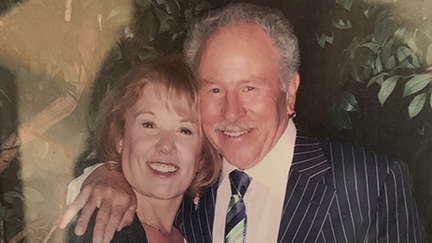“Shut up.” “It’s not about you.”
Sometimes Jaye Kephart needs to be reminded that her husband of 41 years, Mike, is living with dementia. Lewy Body disease, to be precise. Two years ago, she had the messages tattooed on her arm, discretely facing toward her so they serve as a private reminder to not take every comment Mike makes personally.
Mike was a nationally recognized architect. He founded and ran his own architecture firm in Denver for more than 30 years, and recently was inducted into the National Homebuilder’s Association Hall of Fame. He delivered his own thank-you speech in February of 2019 – almost flawlessly, although he wasn’t sure when to leave the stage.
But that’s not to say that Mike is still the “old Mike” who ran his own company, raised two kids with Jaye and wrote a book on fly fishing. He can get lost walking to the bedroom of his ranch-style house. He has trouble distinguishing between forward and backward. And then there’s the hallucinations.
“Part of the challenge of Lewy Body disease is that it’s like a rollercoaster ride,” said Jaye. “Some days, he can get three answers in a row correct on Jeopardy. Other days, he’s worried about people living in the attic of our house. Or in the basement. We don’t have either. The rollercoaster cognitive performance is unnerving. It keeps me off balance.”
 What can a caregiver do?
What can a caregiver do?
Caregiving for a loved one with dementia is not for the faint of heart. Jaye has accepted that role.
“I strongly recommend a support group,” she said. Jaye is active in a group run by the Alzheimer’s Association of Colorado, which also offers online classes and information at no charge. It also offers care and support for those with all types of dementia, as well as their caregivers.
Jaye’s also read everything she can find on the disease, watched videos, and remains active in Lewy Body online groups.
The coronavirus challenge
While Mike’s cognitive performance continues to ebb and flow, until recently he’d still been active outside the home: going to lunch weekly with a caregiver. Taking an Italian class. Walking the dog.
The coronavirus-inspired stay-at-home conditions all Coloradans are living under now is adding a new level of complexity to Mike and Jaye’s lives. They’ve been isolated for nearly two months. Their two children are leaving groceries outside their front door. The Alzheimer’s Association Lewy Body support group meets by phone. And Jaye carries on.
“I have nothing else to do but take care of him,” she said. “There’s no time to do some things I wish I was doing, including meditating and journaling, but I’ll get back to it someday.”
The isolation is challenging in more ways than one. She’s sharing quarantine with a man who isn’t quite the man she married.
Lewy Body disease changes
Over the past few years, Lewy Body disease has changed Mike in a number of ways.
“He was much more reserved before – a total introvert,” Jaye said. “Now he’s very outspoken. We’d go out to eat and I couldn’t get a word in edgewise. And we can’t have conversations like we once did. He’s getting bossy…constantly telling me how to drive and where to turn. I used to get irritated, but ‘shut up’ (the tattoo) has helped me with that.”
What really helped the couple and, Jaye believes, helped save their marriage, was finally getting an accurate diagnosis for Mike.
“He’s probably had Lewy Body for six or seven years,” she said. “My daughter and I knew something was wrong, but most of his doctors missed it.
“He was mean. He ignored me. He would rather watch television. I felt alone when I wasn’t alone. I thought I was nuts,” she said. “I took turns with the kids being in denial. Before we got a diagnosis, I wanted a divorce. Then (after the diagnosis), I felt I couldn’t blame him.”
Part of the challenge of an accurate diagnosis is that very rollercoaster nature of the disease that Jaye described. Lewy Body disease shows differently in people than Alzheimer’s or other forms of dementia.
“Five years ago, he couldn’t draw a clock (a classic dementia diagnosis tool),” Jaye said. “Yet he did much better on that test about five weeks ago. He used to get lost more than he does now. He can make his own cereal, eggs and coffee. And you can ask him about the news. He watches it all the time. But then the hallucinations come in. He’ll tell you about the man on TV with the hamburger on his face…”
Looking ahead
The future offers no promises for Jaye, but she’s coping. She took a class in validation therapy that helps her focus on what Mike’s feeling rather than what he’s doing, and then responding with empathy. And they’re still finding joy in each other’s company.
“We’re just having fun together,” she said. Two years ago, when she got her tattoos, Mike got his first at age 78. There could be more someday.
Assisted living for Mike may also be in the future but, for now, Jaye remains focused.
“(Because of the quarantine) I’m not distracted by all my errands,” she said. “It makes things easier for me, but it breaks my heart that he’s lost all of his freedom.”
Alzheimer's Association
The Alzheimer's Association leads the way to end Alzheimer's and all other dementia — by accelerating global research, driving risk reduction and early detection, and maximizing quality care and support. Our vision is a world without Alzheimer's and all other dementia.™ For more information, visit www.alz.org or call the 24/7 Helpline at 800.272.3900.